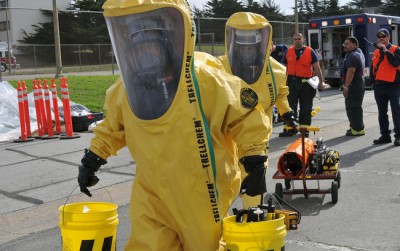A second and third case of a mysterious virus that has killed 145 people has been detected in the United States.
The Centers for Disease Control and Prevention (CDC) has confirmed that an unidentified person in the Orlando area has been diagnosed with Middle East Respiratory Syndrome or MERS, which can spread from person to person via close contact.
Up to 500 people may have come into contact with the infected man, CNN reported. The CDC and health authorities are trying to identify those people and determine if any of them have been infected. This is the second case of MERS in the United States in recent weeks; an Indiana man was diagnosed with it early in May.
“It’s a very big job,” CDC Director Tom Frieden said of tracking down all the people the MERS patient may have had contact with.
On Wednesday, it was announced that a third person potentially has contracted MERS, although further details were not given.
MERS Patient Passed Through Busy Airports
Authorities became aware of the second case on May 8, when the person went to an emergency room. Investigators will have their hands full because the individual passed through airports in London, Boston and Atlanta on the way to Orlando.
The hidden secrets of making herbal medicines…right at your fingertips!
“This virus has not shown the ability to spread easily from person to person in community settings,” Dr. Anne Schuchat, the assistant surgeon general at the US Public Health Service, told CNN. Schuchat is also director of the CDC’s National Center for Immunization and Respiratory Diseases.
“This patient was visiting family and did not visit any theme parks,” Florida’s state secretary for health, John Armstrong, told reporters. The patient is described as a healthcare worker who had been visiting or working in Saudi Arabia.
What Is MERS?
MERS is a viral respiratory illness similar to a cold or pneumonia and is caused by a coronavirus called Middle East Respiratory Syndrome Coronavirus. It originated in the Arabian Peninsula.Around 30 percent of the people known to have contracted MERS have died from it.
Researchers don’t know exactly how MERS spreads, and there is no vaccine for it.
Story continues below picture
MERS likely originated in camels. A study by Columbia University scientists found that 75 percent of the camels in Saudi Arabia may have been infected with the disease at some point.
The Saudi Ministry of Agriculture is now recommending that people who handle camels wear masks and gloves to protect themselves from MERS. In Saudi Arabia, camels are kept as pets much as horses are in the United States. They are also used for meat and racing. MERS has also been detected in bats.
Fatality Rate Of MERS
MERS is similar to Severe Acute Respiratory Syndrome or SARS which killed 774 people in 2004. In addition to the United States, MERS cases have been detected in Saudi Arabia, the United Arab Emirates or UAE, Qatar, Jordan, Oman, Kuwait, Yemen, Lebanon, the United Kingdom, France, Tunisia, Italy, Malaysia, Greece and Turkey.
The average age of a person who dies of MERS is 51. Around 538 cases of MERS have been reported and 145 of those died from the disease.
The elderly, young children and those with serious health problems such as cancer or diabetes are more at risk from death from MERS.
Symptoms of MERS are similar to a cold or the flu, with aches, pains, chills and coughing or wheezing.
Saudi Arabia is one of the most visited places on Earth. More than 3 million pilgrims participated in the traditional Islamic pilgrimage, or Hajj, to the city of Mecca in 2012, the Saudi government reported. Devout Muslims are required to make such a pilgrimage at least once in their lifetime. The 2014 Hajj will not occur until the first week in October.
There could be as many as 7.5 million foreign workers in Saudi Arabia. This includes many Americans working in oil and other industries.
Are you concerned about the spreading of MERS? Tell us in the comments section below.
Sign up for Off The Grid News’ weekly email and stay informed about the issues important to you
 Off The Grid News Better Ideas For Off The Grid Living
Off The Grid News Better Ideas For Off The Grid Living






